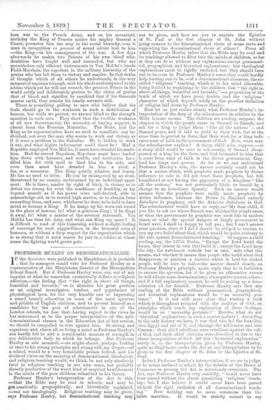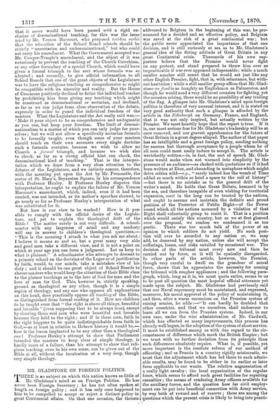PROFESSOR HUXLEY ON DENOMINATIONALISM.
1F the Spectator were published in Marylebone, it is probable . that its managers would vote for Professor Huxley as a representative of the Marylebone district of the Metropolitan School Board. But if Professor Huxley were, say, out of any impulse of what he somewhat eccentrically defines as religious affection,—the feeling that "the right is, above all things, beautiful and loveable," — to abandon his great position as an original investigator, teacher, and popularizer of physiological laws, for the very humble one of impressing a sound homely education on some of the most ignorant and pitiable of English children, and to present himself as a candidate for the post of schoolmaster in one of the London schools, we fear that, having regard to the views he has announced as to the proper interpretation of the anti- denominational clauses in the Education Act of last session, we should be compelled to vote against him. So strong and sagacious, and, above al), so living a mind as Professor Huxley's can hardly fail to add a considerable amount of strength to any deliberative body to which he belongs. But Professor Huxley as sole monarch,—we might almost, perhaps, looking at once to his strong principles and strong will, say despot,—of a school, would be a very formidable person indeed, and his declared views on the meaning of denominational, theological, and religious teaching would, we think, be not only absolutely fatal to religious teaching in our own sense, but probably directly productive of the worst kind of sceptical bewilderment in the minds of the poor children submitted to his theory.
Professor Huxley's interpretation of the Act is this, —that the Bible may be read in schools, and may be gra nmatically, geographically, and historically explained, —but not theologically. Religious teaching may be given, says Professor Huxley, but denominational teaching may not be given, and how are you to explain the Epistles of St. Paul or the first chapter of St. John without going counter to the denominational views of some sects and supporting the denominational views of others ? From all which Professor Huxley infers that the Bible may be read and its teachings allowed to filter into the minds of children, so far as they can do so without any explanations except grammati- cal, geographical, and historical explanations ; but theological explanations must be rigidly excluded, lest they should turn out to be,—as in Professor Huxley's sense they could hardly help turning out to be,—of a denominational character, the so- called " religious " teaching, which is to his mind allowable, being limited to explaining to the children that "the right is, above all things, beautiful and loveable,"—a proposition of the truth of which we have great doubts, and the 'religious' character of which depends solely on the peculiar definition of religion laid down by Professor Huxley.
Now let us just realize clearly what Professor Huxley's in- terpretation of the duty of the schoolmaster in relation to the Bible lessons means. The children are reading, suppose, the chapter in which the people come to Samuel, to Ramah, and ask for a king to judge them "like all the nations " ; and Samuel prays, and is told to yield to their wish, but at the same time to protest to them that their wish for a king indi- cates want of faith in the government of God. Now, what may the schoolmaster explain ? A sharp child asks, suppose,—as a sharp child would be sure to ask,—why, if Samuel disap- proved of a king for the Jews, and God intimated to him that it arose from want of faith in the divine government, Eng- land has kings and queens. As far as we can understand Professor Huxley's rule, the answer certainly could not be that a nation which, with prophets made prophets by divine influence to rule it, did not trust those prophets, but felt humiliated at not having the pageantry of a kingdom "like all the nations," was not particularly likely to benefit by a change to an hereditary dynasty. Such an answer would assume that the prophets were really made prophets by divine influence, whereas the Deists in England entirely disbelieve in prophecy, and the Atheists disbelieve in God. The schoolmaster would have to reply,—" My dear child, if you like to ask me where Ramah was, whither the people came, or what the government by prophets was most like in modern times, or what the special dangers of kingly government in Israel were, I shall be happy to tell you ; but I can't answer your question, since if I did I should be obliged to explain to you my own belief about God, which would be quite contrary to the rule against denominational teaching." Or suppose a child reading, say, the 127th Psalm, "Except the Lord build the house, they labour in vain that build it : except the Lord keep the city, the watchman waketh but in vain," asks what this means, and whether it means that people who build what God disapproves, or garrison a fortress which is held for wicked people, will be sure to fail,—the master should clearly, on Professor Huxley's principle, again reply that he is forbidden to answer the question, for if he gives an affirmative answer he will affront some denominations; if a negative answer, others ; and if a full explanatory answer, he will be setting up a deno- mination all for himself. Professor Huxley says that any
reading of the Bible without grammatical, geographical, and historical explanations would be " an unworthy pre- tence." Is it not still more clear that reading a book which is throughout occupied with the dealings of God, on principles which evade any explanation of those dealings, would be an "unworthy pretence ?" Besides, what do not 'historical' explanations in such a matter include ? According to the only history we have, it was God who led the Israelites into Egypt and out of it, and through the wilderness and into Canaan ; their chief rebellions were rebellions against the rule of God, and their chief victories were described as due to the direct interpositions of God. All this "historical explanation" surely is, on the interpretation given by Professor Huxley, quite as illegitimate under the Act as any interpretation to be given to the first chapter of St. John or the Epistles of St. Paul.
Indeed, Professor Huxley's interpretation, if we are to judge, as he seems inclined to admit, by the debates of the House of Commons in passing the Act, is notoriously erroneous. The Act, says Professor Huxley very candidly, "would never have been passed without the clause permitting 'religious' teach-
ing; but I also believe it would never have been passed without the rigid exclusion of all denominational teach- ing." Now nothing can be more erroneous than the
latter assertion. It would be strictly correct to say
that it never would have been passed with a rigid ex- clusion of denominational teaching, for this was the issue tried by Mr. Vernon Harcourt, who proposed totidem verbis that the education of the School Board schools should be strictly " unsectarian and undenominational," but who could not carry his amendment. What the Government accepted was Mr. Cowper-Temple's amendment, and the object of it was notoriously to prevent the teaching of the Church Catechism, or any other formulary of a special Church, which would have given a formal triumph to the sect whose formula was so adopted ; and secondly, to give official information to all School Boards that one of the great objects of the Legislature was to have the religious teaching as comprehensive as might be compatible with its sincerity and reality. But the House of Commons positively declined to fetter the individual teacher by prohibiting him from giving any teaching which might be construed as denominational or sectarian, and declined, as far as we can judge from close observation of the debate, expressly in order to guard the individual freedom of the masters. What the Legislature and the Act really said was,— ' Make it your object to be as comprehensive and undogmatic as you can, but keep your freedom. The limit of denomi- nationalism is a matter of which you can only judge for your- selves ; but we will not allow a specifically sectarian formula to be formally taught, even though some of your masters should teach on their own accounts every single doctrine such a formula contains, because we wish to allow no Church a formal triumph, and because we wish also to check, as far as a strong official hint can check, the denominational kind of teaching." That is the interpre- tation which we draw from a very close attention to the debates of the Legislature, and we entirely concur, therefore, with the meaning put upon the Act by Mr. Fremantle, the rector of St. Mary's, Bryan ston Square, in his correspondence with Professor Huxley. If Professor Huxley disputes this interpretation, he ought to explain the failure of Mr. Vernon Harcourt's amendment, which, indeed, even if it had been carried, was not intended, as its author's speeches showed, to go nearly so far as Professor Huxley's interpretation of what was substituted for it.
But how is our view to be 'worked? How is it pos- sible to comply with the official desire of the Legisla- ture, and yet to explain the theological drift of the Bible ? The matter surely is not very difficult. A school- master with any largeness of mind and any modesty will say in answer to children's theological questions,— " This is the meaning I attach to what you ask me about ; I believe it means so and so, but a great many very able and good men take a different view, and it is not a point on which at your age you can form a judgment. Let us keep to what is plainest." A schoolmaster who attempts to descant to a primary school on the doctrine of the Logos or of justification by faith, would, to our minds, take a mistaken view of his duty ; and it should be one great object of School Boards to choose masters who would keep the attention of their Bible class to the plainer teachings as to the love of God for man and the love of man for God. This, however is, strictly speaking, ground as theological as any other, though it is a simple region of theology, and any one who opposes all explanations on this head, does practically oppose all teaching of the Bible, as distinguished from formal reading of it. How are children to be taught even that "the right is above all things, beautiful and loveable " (even supposing that to be always true), except by showing them real men who were beautiful and loveable because they held to the right ; and if in these men, faith in the right happens to be quite indistinguishable from faith in God,—as at least in relation to Hebrew history it would be,— how is the lesson implanted to be any other than a theological one ? Professor Huxley's attempt to show that Parliament intended the masters to keep clear of simple theology, is hardly more of a failure, than his attempt to show that reli- gious teaching, even in his own sense, can be given out of the Bible at all, without the inculcation of a very deep, though very simple theology.



































 Previous page
Previous page